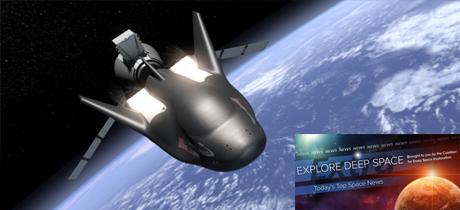In Today’s Deep Space Extra… Former NASA astronaut calls on the White House and Congress to sustain International Space Station operations. Congress may be near a spending measure that would prevent another U.S. government shutdown. NASA orders its first space station resupply mission from Sierra Nevada.
Human Space Flight
Don’t give up on the International Space Station
New York Times (2/7): It’s much too soon for the White House and Congress to consider ending NASA’s participation in the International Space Station, writes retired astronaut and Navy aviator Mark Kelly in an op-ed. The Space Station stands as a symbols of U.S. global leadership and cooperation. It’s also nurturing a U.S. commercial space industry and new technologies that benefit everyday life, says the four time NASA space shuttle commander and pilot.
Sierra Nevada Corporation receives official NASA launch window for Dream Chaser spacecraft
Sierra Nevada (2/7): NASA has ordered its first International Space Station resupply mission from Sparks Nevada, based Sierra Nevada Corporation and the winged, reusable and automated Dream Chaser. Launch is planned for late 2020. Sierra Nevada joined Orbital ATK and SpaceX as Space Station cargo mission providers in January 2016 under a NASA launch agreement that covers launches planned between 2019 and 2024, the current end date for space station operations. Dream Chaser adds the only capability to return cargo to Earth with runway landings.
The crowds are back. Now can the space industry build on the momentum?
Washington Post (2/7): SpaceX’s successful Falcon Heavy launch is raising the stakes for the nation’s commercial space industry, stirring new interest in space activities as witnessed by the many tourists and news media that gathered near and at NASA’s Kennedy Space Center to witness the liftoff. The question now is whether the industry can help to maintain the momentum as the Trump administration calls on NASA to return human explorers to the lunar surface.
The Falcon Heavy: A good show, but not necessarily great business
Wall Street Journal (2/7): The launch this week of SpaceX’s mammoth Falcon Heavy rocket was a feat, but many in the space industry doubt it will bring the company big commercial business. The heavy-lift vehicle appears to be too small for ferrying crews or delivering major cargo packages into deep space, said executives attending a commercial space conference here Wednesday. At the same time, it seems too big to serve today’s generation of smaller satellites, they added.
Space Science
Portable DNA sequencer searches for life in extraterrestrial-like conditions
Seeker (1/28): As it did on the International Space Station, the portable DNA sequencing device called MiniON, manufactured by the United Kingdom’s Oxford Nanopore Technologies functioned well during an Arctic trial, leading researchers to believe the device could play a role in efforts to seek evidence of DNA based life on Mars, Jupiter’s moon Europa and Saturn’s moon Enceladus.
NASA should start funding SETI again
Scientific American (2/7): In 1993, Congress passed legislation that prevents NASA from spending on Search for Extraterrestrial Intelligence, or SETI activities. Though NASA’s astrobiology programs continue to seek out evidence of habitable environments beyond Earth and bio markers, its time to permit NASA to again invest in efforts to look for high tech evidence of intelligent life beyond the solar system, according to the publication.
The solar system probably has thousands of captured interstellar asteroids
Universe Today (2/7): The hypothesis follows the discovery of the first interstellar asteroid, Oumuamua, in October 2017. A follow on Harvard led study concludes there could be a few thousand similar objects in the solar system at any one time.
Other News
Today’s tidbits: February 7, 2018
Spacepolicyonline.com (2/7): Congress may be close to a budget agreement that would prevent another U.S. government shutdown on Thursday at midnight, possibly with another “stop gap” spending measure effective until March 23 that would enable lawmakers to further pursue agreements raising spending limits and address immigration reforms. Also, the recently re-established National Space Council is to meet for a second time on February 21 at NASA’s Kennedy Space Center, with regulatory reform as its topic.
Don’t expect deep discounts on preflown SpaceX boosters
Space News (2/6): SpaceX is not positioned yet to offer large discounts for launch services using previously flown Falcon 9 hardware, according to Hans Koenigsmann, the company’s vice president for build and flight reliability. Reductions are not planned until the company recovers investments in the reuse technologies, he told the Small Satellite Symposium.
Military certification the next big test for Falcon Heavy
Space News (2/7): More flights of the Falcon Heavy await, if SpaceX is to receive certification from the U.S. Air Force to launch military payloads. The first of those is booked for June. But the certification could take as many as 14 missions.

